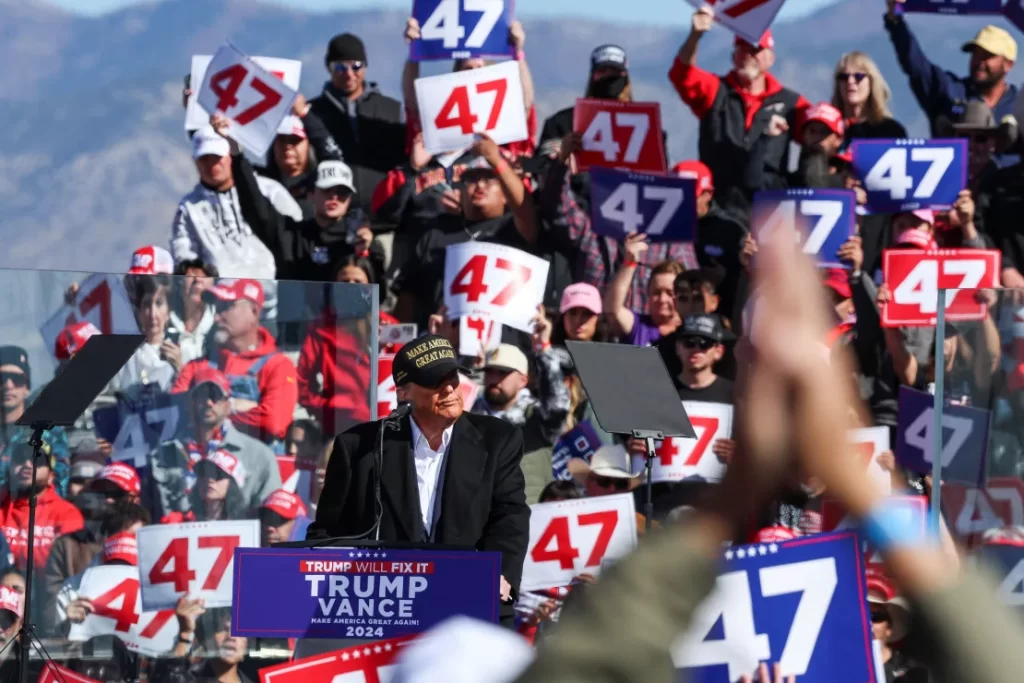Trump Erodes Trust in Upcoming Election with Baseless Claims
4 min read
Former President Donald Trump delivers remarks at Albuquerque International Sunport, in Albuquerque, New Mexico, on October 31, 2024. Brendan McDermid/Reuters

Former President Donald Trump delivers remarks at Albuquerque International Sunport, in Albuquerque, New Mexico, on October 31, 2024. Brendan McDermid/Reuters
Donald Trump recently asserted that if divine intervention were involved in the vote counting, he would win the upcoming election in a landslide, even in traditionally Democratic states like California. This claim underscores how Trump’s persistent allegations of election fraud have spiraled into increasingly absurd territory.
However, Trump’s comments reveal more than mere hyperbole; they represent a calculated effort to undermine confidence in the electoral process as the 2024 election approaches. After having previously claimed that he was cheated out of the presidency in 2020, Trump is now intensifying rhetoric that could poison public trust for years to come. His attempts to sow doubt mirror a broader trend among his supporters, who have rallied around his false narrative of widespread voter fraud.
At a recent rally in New Mexico, Trump falsely insisted that the state had been part of his electoral victories in 2016 and 2020, stating, “I believe we won it twice.” He further declared, “If we could bring God down from heaven and he’d be the vote counter, we’d win this, we’d win California.” In reality, Trump lost New Mexico by significant margins in both elections, but his fabrications serve a strategic purpose: they set the stage for legal challenges should he lose again.
This strategy aligns with efforts from GOP officials and “Make America Great Again” activists, who are actively preparing to dispute any unfavorable election outcomes. Comprehensive investigations have revealed that many of the same figures who attempted to overturn Joe Biden’s victory are now laying the groundwork to contest results if Trump falls short once more.
Additionally, Trump and Republican National Committee officials have been raising alarms about mail-in voting issues, particularly in battleground states like Pennsylvania. Comments from some GOP leaders have suggested that electoral votes could be allocated before all votes are counted, a move that would undermine democratic norms. Such statements only fuel fears that Republican-controlled state legislatures might ignore the will of voters, awarding victories based on exaggerated claims of fraud.
The situation has been exacerbated by ongoing efforts to highlight non-existent voter fraud by non-citizens. For instance, Virginia Governor Glenn Youngkin recently pushed to remove suspected non-citizens from voter rolls, despite warnings that this could disenfranchise legitimate voters. This tactic has further muddied the waters of electoral integrity.
In a disturbing twist, misinformation spread by figures like Elon Musk has complicated election officials’ attempts to maintain public confidence in the voting process. The combination of Trump’s unfounded claims and these coordinated misinformation campaigns is creating a chilling effect on the integrity of the upcoming election.
Historically, both major parties engage in legal battles over electoral processes, yet the current environment is unique. Trump stands as a former president—potentially a future candidate—who openly questions the legitimacy of elections long before they occur. His rhetoric sets a troubling precedent for the democratic process, as he warns that he will only accept results he personally deems fair.
In a Truth Social post, Trump seized on reports of potential irregularities in Pennsylvania, calling for immediate action and proclaiming, “We caught them CHEATING BIG in Pennsylvania.” His insistence on fraud—despite investigations being ongoing—exemplifies how his narrative feeds into a cycle of conspiracy theories that can undermine public trust in elections.
Democratic leaders, such as Pennsylvania Governor Josh Shapiro, have countered Trump’s claims, emphasizing that the electoral process will be fair and secure. Shapiro reiterated, “Donald Trump wants to create chaos and stoke division about our system.”
The current electoral climate has made it clear that a new tradition is taking shape: a pre-election strategy aimed at undermining trust in the electoral process. Trump’s relentless attacks on the credibility of American elections could leave a lasting impact on public perception, contributing to a troubling decline in faith in the electoral system.
Polls indicate that a significant number of voters doubt Trump will concede if he loses, while most believe that Vice President Kamala Harris would accept an election defeat. Despite this, voter turnout remains high, with over 60 million Americans casting their ballots ahead of the election. The system ultimately worked to ensure the rightful winner took office after the contentious 2020 election, even as Trump’s baseless claims were rejected in numerous courts.
The fabric of democracy relies on the trust of the governed, and Trump’s unwillingness to uphold this principle poses a significant risk. As the nation faces one of its most critical elections, the need to reaffirm commitment to democratic values has never been more pressing. Gabriel Sterling, a prominent Republican figure, emphasized this sentiment, urging the importance of accepting electoral outcomes as a cornerstone of American democracy. “We have to learn to accept outcomes,” he stated, highlighting the essence of a functioning democracy amidst these challenging times.